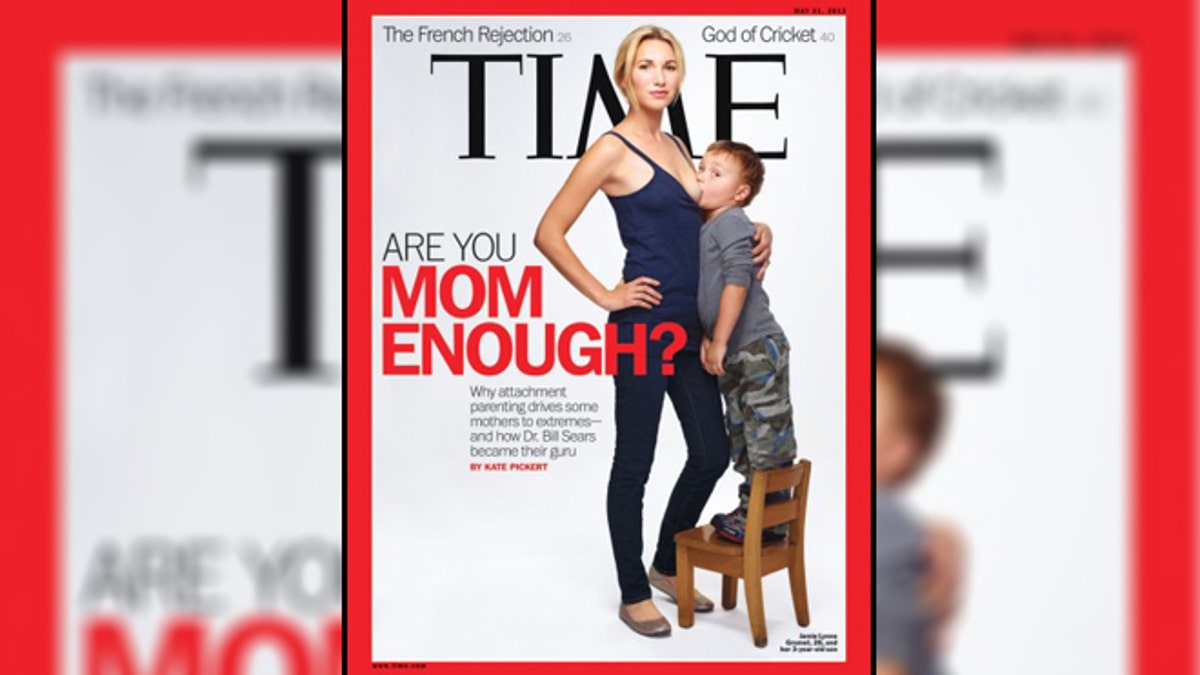
Time's latest cover, for a story on extreme parenting, is sparking a debate over the image as much as the parenting.
As a young 25-year-old new mom, when I first got pregnant with my daughter, I was determined to breastfeed. I was also convinced she would not sleep in our bed, and planned to start getting her used to sleeping in her own crib, in her own room, from the first night at home. As any parent knows, nothing in parenting ever goes as planned.
My daughter ended up sleeping in our bed until she was 3 years old and only nursed for four months. If it weren't for me working outside the home, she would have nursed longer. Breastfeeding became hard for me to keep up with due to the conditions at my job and lack of space for me to pump, so I stopped. Co-sleeping worked for us because it allowed everyone to get some sleep, so that's what we did. It all worked out. Attachment parenting was not a term we were familiar with at the time. We just did what worked for us.
When I got pregnant a second time with my son, again I was determined to not make the same "mistake" of letting him sleep in our bed. This time, though, I knew I would be able to nurse longer since I own a home-based business.
In both cases, family had an opinion. When nursing my daughter, I would get comments about whether or not she was getting enough food. My son ended up nursing until he was thirteen months old, which means it was just four months ago that we weaned him. You can imagine the amount of comments, questions, and strange looks I got with him!
Regarding the co-sleeping, family and friends were convinced my husband and I had no intimacy, privacy, or life in general because our daughter shared our bed for so long. What they didn't know was the screams she gave in the middle of the night if she slept in her own room. We co-slept because it allowed us to get rest, ironic as it may sound. As a parent, you do what works for you and what's best for your family.
It's easy to generalize and say that parents who follow attachment parenting ideals are raising children that are too attached. Or perhaps one can say that those who do not follow attachment parenting principles are raising children that are not nurtured enough. In our Latino culture, mamás are often pegged as overbearing and too attached. We are thought to be helicopter moms that are afraid to let go of our kids and let them grow up. There may be truth to that, but I think there's truth in that regardless of your culture.
The truth is, no one knows. Every kid, every family, and every household is different. Why should I care if you nurse your child into toddler-hood or beyond? For that matter, why should you care? When these kids grow up, I doubt it will matter much if they were nursed for three years or not at all, or whether they co-slept or not. As it stands, my 6-year-old that nursed for four months and co-slept for three years, is just as close to us as her 1-year-old brother that nursed for thirteen months and hasn't done much co-sleeping. Nurturing comes in many forms; attachment parenting is not the only way.
When the TIME Magazine cover showing a woman breastfeeding her 3-year-old came out, I heard comments ranging from "That's just plain weird!" to "Good for her!" Attachment parenting discussion aside, I think the bigger issue is the accompanying headline, "Are you mom enough?" Such a statement only sensationalizes the topic and fuels criticism on motherhood, something we as women already struggle with enough. Introducing an article on attachment parenting with "Are you mom enough?" only implies that those who do not follow attachment parenting are indeed not mom enough. What is that anyway? How does one define being 'mom enough' exactly?
At the very least we can say one thing about this TIME magazine cover: it's got many people talking about parenting and motherhood. Women all over are raising their voices and shouting, "Yes, I'm mom enough and how dare you question it?"
"I don't care what anyone does with their kid - but to caption this 'Are you Mom enough?' is insulting to all mothers. I could only breast feed for two weeks. And being a mom of a 6- year-old with autism - who fights for services, deals with the Board of Education and is constantly advocating for my child - I know I'm mom enough." - Lisa Quinones-Fontanez, Founder of Autism Wonderland
